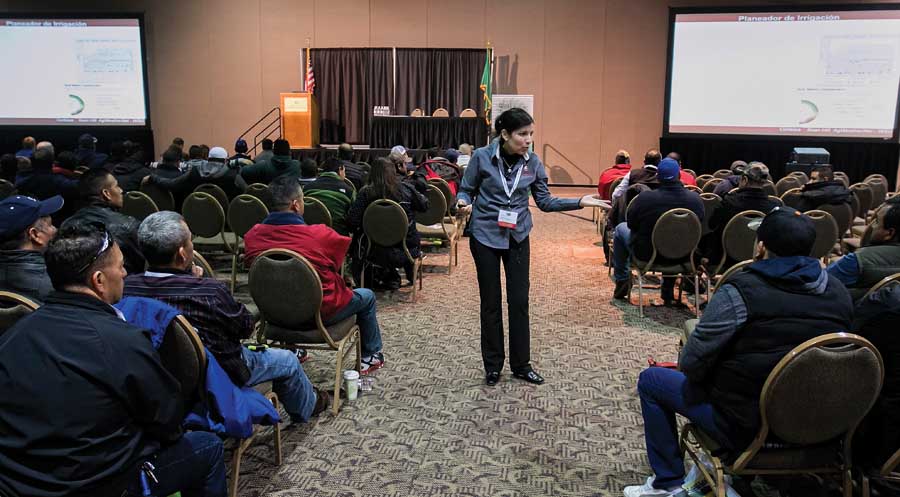It should come as no surprise that the biggest challenge for Western growers this year plays a starring role at the Washington State Tree Fruit Association annual meeting: drought.

Dr. Melba Salazar-Gutierrez, WSU, speaks at the Washington Hort Show in Kennewick, Washington on December 2, 2014. (TJ Mullinax/Good Fruit Grower)
“Growing Forward: Solutions for Current and Future Challenges” is the theme for the 111th conference December 7-9, and with opening day talks planned on weather variability, water resources, infrastructure, and crop stress, perhaps no topic better illustrates that theme.
Most or all of Washington, Oregon, and California and remain in varying stages of severe to exceptional drought, and forecasters predict continued and perhaps even worsening drought conditions for the Pacific Northwest through winter and into spring of 2016.
Many growers used emergency wells to get through this season as water was shut off in parts of Washington in early August, But who knows what the future holds, said Kevin Knight, this year’s annual meeting chair and an apple, cherry and pear grower in Naches, Washington.
“We’ve really only experienced one year at a time, but California is going on quite a few years straight of drought,” Knight said. “With no snow or precipitation this winter, next year could get ugly for everybody.”
This year’s conference includes in-depth seminars for specific crops, as well as sessions designed to address issues of interest to everyone, such as labor, pests and diseases, technology and food safety. Another issue of concern is pollination, particularly for some cherry and pear growers who struggled at bloom this year.
The declining bee population and expense to bring bees to the orchard are growing challenges, said Jose Ramirez, Washington State Tree Fruit Association board chair, who grows apples and cherries near Royal City and manages another orchard of apples, cherries and pears.
Knight said growers should expect updates on research into controlling diseases in Manchurian crab apples and research into alternative pollinizers.
Manchurian crab apples have been widely planted in Pacific Northwest orchards because they bloom early enough to pollinate king blossoms of Red Delicious and work well with other varieties like Fuji, Gala, and Granny Smith. However, the variety also can be subject to crab apple canker diseases, leading to postharvest rots and export issues.
Returning to the program this year is a session on organics, in large part because that sector continues to be a bright spot for the industry. Consumer demand for organic foods pushed up U.S. retail organic sales by 11 percent in 2013 compared to the previous year, and this growth is expected to continue.
“Our industry is growing and, organically, it’s growing a lot. We need to keep that program consistent,” Ramirez said. “There’s a lot to learn in organics. As a new grower, you see good pricing, but you don’t see the work that goes into it and the issues that you face as an organic grower.”
The annual meeting and Northwest Hort Expo will be held at the Yakima Convention Center and the Yakima Sun Dome. Visit www.nwhortexpo.com or www.wstfa.org for official event information. Go to www.hortshow.com for Good Fruit Grower’s comprehensive coverage.
– by Shannon Dininny






Leave A Comment